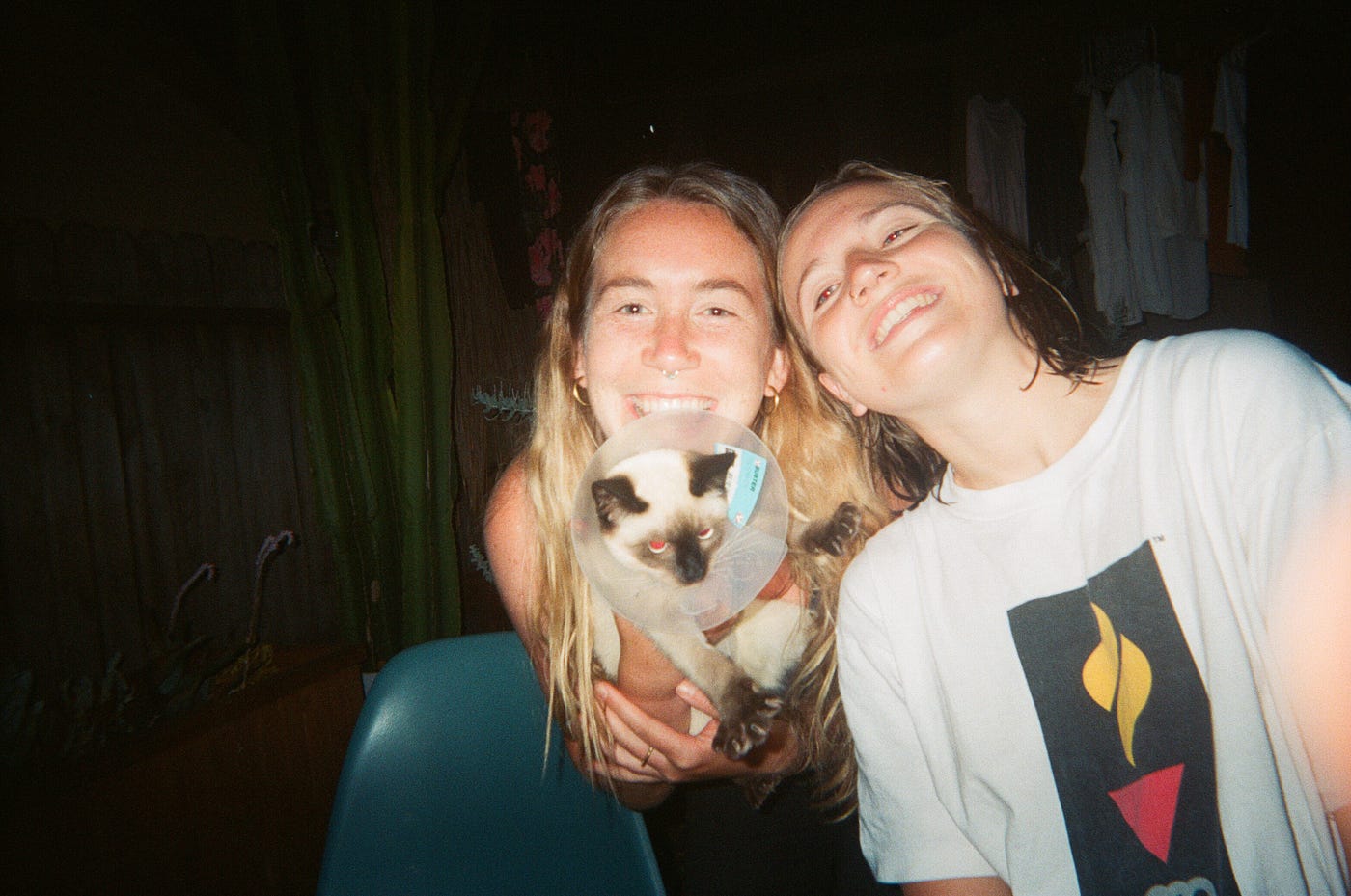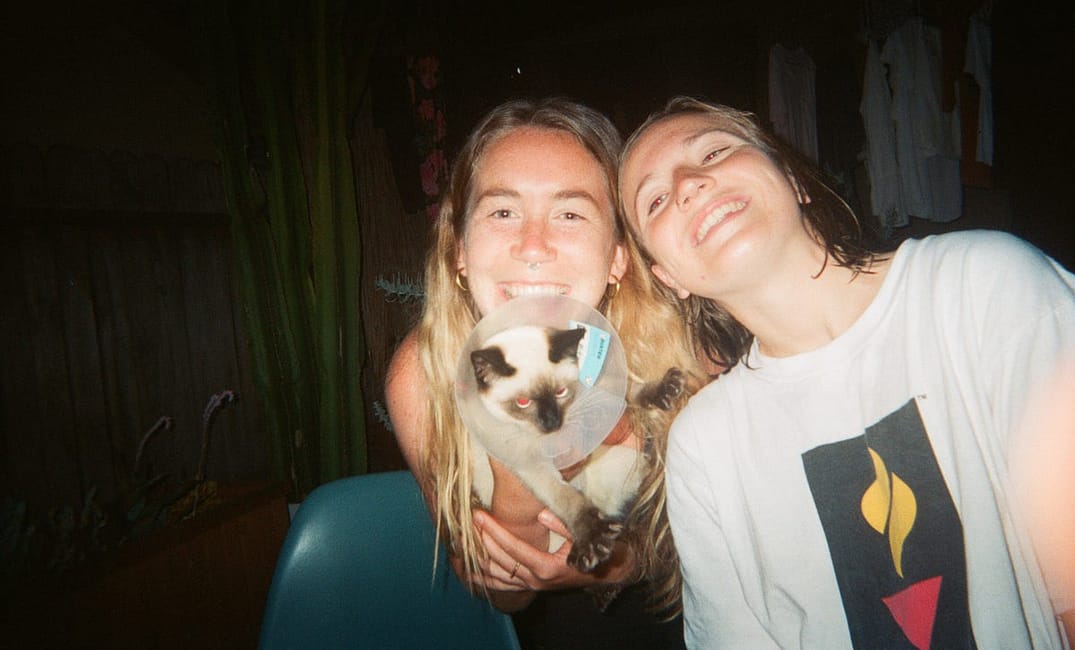
I sat in the passenger’s seat as Sarah drove us across I-80 West, the “Big Friendship” episode of the podcast Call Your Girlfriend coming through her car’s speakers.
“Are you listening?” Sarah asked me, it is clear that I was in fact, not listening at all, and was distracted by the golden blur of dead grass out the window.
“Now I am,” I said.
In the podcast, long-time friends Aminatou Sow and Ann Friedman talk about the release of their book and the term that they’ve coined, “Big Friendship,” which they define as a “strong, significant bond that transcends life phases, geographical locations, and emotional shifts.” As soon as I started listening to the podcast, it became obvious that I was craving what Aminatou and Ann must have been when they invented the term Big Friendship: some sort of definition for a relationship that transcends the normal bounds of what having a “friend” is traditionally understood to be.
For a bit of background: I’ve spent three apartments, two years, and one pandemic living with Sarah in Oakland, California. She’s my rock, my co-parent (to our two cats, Apple and Mushroom), and happily both the first person I see in the morning and the last person I see at night. I love Sarah in a unique combination of the way I love my closest friends, my family, and to some extent, romantic partners I’ve had in the past: passionately, and in a way that signifies that I want our relationship to last for a very long time.
We met, randomly, at an apartment showing in Berkeley, about three weeks after I moved to the Bay Area. We both hated the apartment we were looking at, but somehow decided to look for an apartment together at the end of our first conversation, which should not have worked.
Together, we frequently cover the logistics of living together — signing leases, disposing of “presents” dropped off at our doorstep by our cats, carrying that same dresser up several flights of stairs. We’ve found solace in our social activities as well, including bike rides, runs, and beers from Roses’ Taproom.
Sarah and I initiated our ongoing conversation about how to label ourselves last year, when we both found ourselves dissatisfied with the term “roommate.” To me, it sounded undignified to describe the amount of love and care put into a relationship with someone that means so much to me the same way I used to describe someone I shared a haphazard bunk bed with in undergrad. Hence, our conversation about labels began.
We mulled through different terms typically associated with close friendships. Is Sarah my best friend? No, I have one of those, and she lives in New York.
What Sarah and I have is different from what I consider to simply be a “best friendship” because of the amount of thought, consideration, and care naturally put into the relationship on a day-to-day basis, which, in my experience, is associated more with a partnership.
Is Sarah my romantic partner, then? Also no.
I’ve had romantic partners, and Sarah and I don’t feel the same kind of romantic feelings for each other that I’ve felt with romantic partners in the past. Is our relationship what Aminatou and Ann meant when they coined the term Big Friendship? Maybe, but it doesn’t feel the same. My interpretation of what Aminatou and Ann are talking about revolves around placing an emphasis on friendship and the importance of communicating with your friends the same way you think about prioritizing communication with your romantic partner.
But what about when your friend is already your partner, in a non-romantic sense? I decided to do some digging to see what others have already written about relationships like mine and Sarah’s, and quickly came across a term first coined by the asexual/aromantic community called “queerplatonic.”
Wow, I love this, I thought upon discovering the term, as when I think about my relationship with Sarah, the words: queer and platonic (plus, like anyone with a heartbeat, I’m a sucker for a portmanteau).
However, upon doing more research, I learned that “queerplatonic” relationships don’t necessarily have anything to do with identifying as queer.
In fact, many people try to place relationships such as these under a hetero lens to make them appear to be less queer then they inherently are, which includes terms such as “bromance,” or sometimes, “girl crush.” The aforementioned titles are basically just used to establish the heterosexuality of one’s feelings for another person, which seems problematic in its own way, but doesn’t need to be discussed right now.
The definition of a queerplatonic relationship can be whatever you want it to be, depending on what feels best to you and the other(s) involved. That’s what I like best about the term: it’s flexibility to suit whatever you happen to feel for the other person. Urban Dictionary, of all places, actually had the best definition I could find on the Internet. It is as follows:
Adjective describing a relationship that is more intense and intimate than is considered common or normal for a “friendship”, but doesn’t fit the traditional sexual-romantic couple model. It is characterized by a strong bond, love, and emotional commitment yet is not perceived by those involved as “romantic”.
Bingo. There it is.
So, why do I think that queerplatonic intimacy deserves more respect? Well, many different types of relationships deserve more respect, Big Friendships and queerplatonic relationships included. Societally, we still very much follow a “one size fits all” approach to the sexual-romanic couple model, which features two married life partners (traditionally a cis-man and a cis-woman, but that definition is thankfully changing to encompass much of the LGBTQI+ community) that are both sexually and romantically attracted to each other.
This model works for many, which is why, legally, you get a tax cut when you file jointly with your (married) partner, you can add (one) spouse to your health insurance plan, and bringing your girlfriend to Thanksgiving is much more socially acceptable than bringing “just a friend” as a plus one.
But, the sexual-romantic couple model leaves little room for non-monogamous relationships, the many identities I don’t know about yet, and those who simply value friendships as much as romantic relationships. But it’s time to acknowledge that forms of intimacy exist outside of the sexual-romantic couple model (which to be honest, is not something I cognitively knew existed until yesterday), and to elevate those relationships as equivalent in social status to romantic relationships.
After all, evidence shows that there are benefits to friendship, including decreased risk of suicidal thoughts, generalized depression, and anxiety, and an increase in, what one study calls, life satisfaction.
Sign up for The Bold Italic newsletter to get the best of the Bay Area in your inbox every week.
I’m here to say many things, but the gist is this: bring your friend to Thanksgiving because whatever relationship is important to you is valid.







